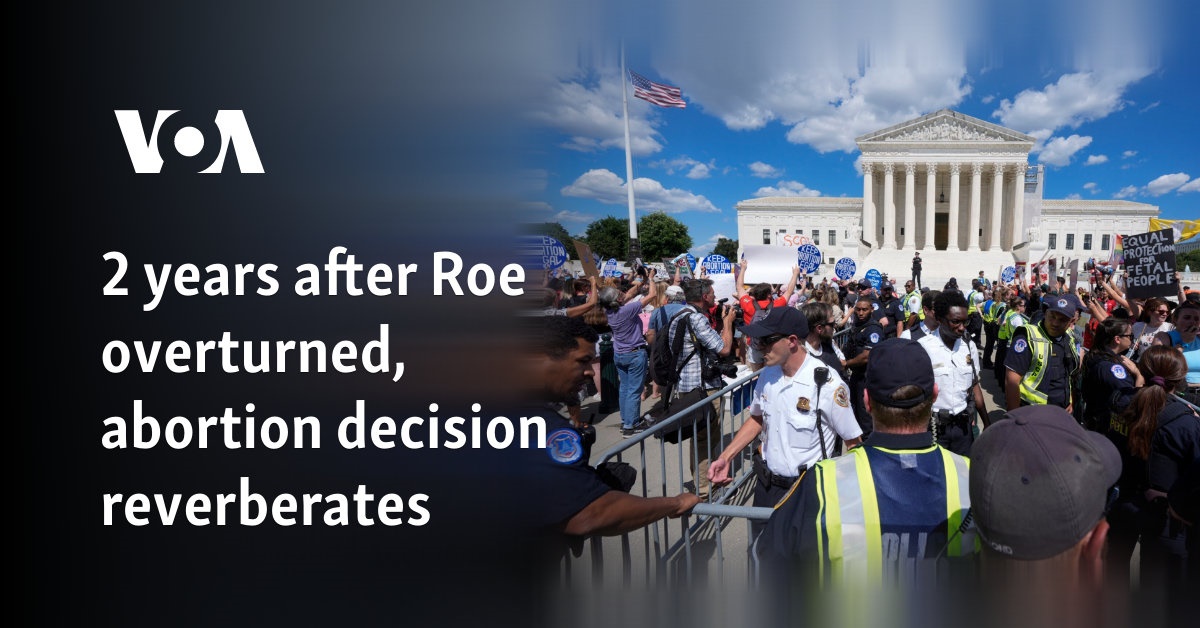Monday marks two full years since the Supreme Court overturned the constitutional right to an abortion. In that time, access to the process across the United States has shifted dramatically, with large parts of the country effectively banning the procedure, while others have passed laws to safeguard it.
Dozens of abortion clinics across multiple states have shut down in the intervening two years. And with increasingly restrictive laws still coming into force, that number may still rise.
Fourteen states have issued bans so comprehensive that it is virtually impossible to receive legal abortion services within their borders. Some, such as Texas, have laws on the books that impose potentially severe penalties on individuals who help a woman travel out of state for the purpose of receiving an abortion.
Widespread impact
According to the Guttmacher Institute, an organization that studies sexual and reproductive health issues, the impact of the legal changes has been broad and varied. For example, women without ready access to a reproductive health facility must rely on telehealth appointments to receive diagnoses, and they are often required to terminate their pregnancies at home by taking medication sent by mail.
According to Guttmacher’s research, the bans have resulted in a decline in the quality of health care women receive.
In some states with highly restrictive laws, women with potentially life-threatening pregnancy complications must wait until they are at imminent risk of harm before doctors are allowed to perform abortions. In other cases, the closure of local reproductive health facilities has left pregnant women unable to access quality prenatal care and other women unable to access contraceptive care.
Abortion bans have even prevented new doctors at medical schools in states with the strictest laws from receiving instruction on how to perform abortions.
Onerous travel requirements
Many women who do leave their home state to get an abortion must travel hundreds of miles, sometimes in serious medical distress, to access care.
“Since the Dobbs decision, and the domino effect of state abortion bans that followed, drive times to access abortion care grew by 300% nationally,” Sara Estep, associate director of the Center for American Progress Women’s Initiative, said in an email to VOA. “The glaring increase in drive time truly understates the impact this has on women in some of these states and congressional districts.
“In Florida, drive times grew by nearly 2,400%, and in the south of Texas women have to drive more than 11 hours one way,” Estep said. “These abortion bans force women to take days off of work, find childcare, pay for gas, and the many other travel-related costs are often untenable for women who are low-income, young, Black, or Hispanic, and that’s before we even consider the cost of the procedure itself.”
Future unclear
“While it will take some time for researchers and policymakers to fully understand the impact of Dobbs, some of the damage is already clear from the confusion and chaos now engulfing providers, clinics, and patients,” Candace Gibson, director of state policy at the Guttmacher Institute, said in an email to VOA.
“We know groups already marginalized by the health care system will feel the impacts of Dobbs most sharply, both in terms of being denied access to critical abortion care and ripple effects like worsening maternity care deserts and potential risks for maternal health,” she said, adding, “We must urgently support policies that protect abortion rights to ensure equitable sexual and reproductive health care for all.”
Focus in election
The issue of abortion is already playing a major role in the November presidential election, in which former President Donald Trump is attempting to take back the White House from President Joe Biden.
Democrats are pointing out that the Supreme Court’s decision in Dobbs v. Jackson Women’s Health Organization, which overturned the federal right to an abortion, would not have been possible without Trump’s decision to nominate three judges known to be hostile to the procedure to the court.
In remarks prepared for delivery during an appearance Monday in Maryland, Vice President Kamala Harris accused the former president of “the stealing of reproductive freedom from the women of America.”
“Trump has not denied, much less shown remorse, for his actions,” Harris said. “Instead, he proudly takes credit for overturning Roe. In a court of law, that would be called an admission. Some would say a confession.”
Senate Democrats on Monday launched a series of women-targeted advertisements highlighting the changes that have occurred in the two years since Dobbs.
Outside groups will get involved as well. Planned Parenthood, which provides reproductive health services and advocates for the right to those services, has said it will spend $40 million on abortion-related advertising ahead of the November elections.
Conservative positions
Since the Dobbs decision, U.S. conservatives have suffered several electoral setbacks due, at least in part, to the widespread unpopularity of the new restrictions on abortion being put in place. This has made discussing the issue in an election year a delicate exercise.
Trump has, on multiple occasions, touted his role in crafting the conservative Supreme Court majority that generated the Dobbs ruling. However, he typically frames the decision not as restricting abortion, per se, but as sending the issue back to the states.
“The people will decide, and that’s the way it should be,” he said during an appearance before a conservative Christian organization over the weekend. “The people are now deciding.”
Trump has been careful not to endorse calls from several anti-abortion organizations to implement nationwide restrictions on the procedure.
Some conservative organizations, however, have demanded stronger federal restrictions on abortion.
For example, Project 2025, a blueprint for an overhaul of the federal government under Trump put together by a coalition of conservative organizations, has called for renewed enforcement of a largely forgotten federal law — the Comstock Act — that outlaws the use of the Postal Service to send medications that cause abortions.







